GDP is forecast to grow about 3% annually, driven by higher oil prices, investments and consumption, but concerns about the fiscal deficit remain an issue.
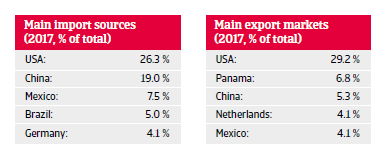
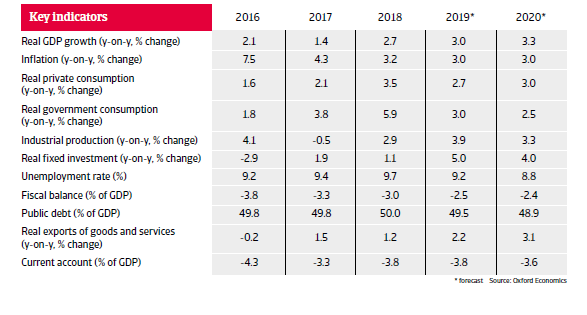
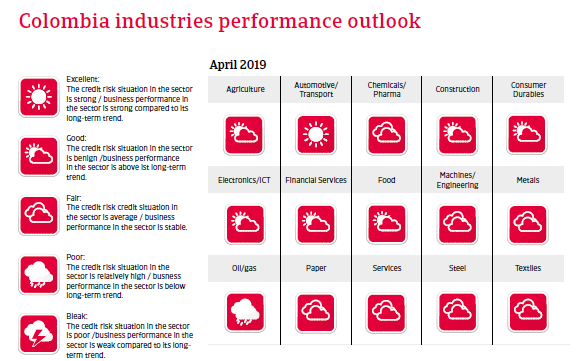
Political situation
The peace process faces major challenges
After several years of negotiations, in December 2016 a peace accord between the Colombian government and the main guerrilla group FARC was finally signed. In August 2017 most FARC rebels demobilised and handed over their last weapons to UN representatives, and the government declared the 52 year-old armed-conflict formally over. However, the peace process faces major challenges, as the former FARC guerrillas struggle to integrate into society, and some parts of the peace accord remain controversial (e.g. impunity for former FARC members). President Duque takes a tougher stand on those issues than his predecessor, while the government in early 2019 suspended talks with the smaller Ejército de Liberación Nacional (ELN) guerrilla group after several bomb attacks.
The relationship with the Maduro government in Venezuela remains strained, and over the past two years more than one million Venezuelans have fled to Colombia.
Economic situation
Solid growth rates, but fiscal deficit issues remain
In 2019 and in 2020 the economy is forecast to grow about 3% annually, driven by higher oil prices, investments and consumption. The mining industry should see steady growth over the coming years, supported by competitive coal exports and growth in gold production. In recent years, sound economic policies have contributed to higher earnings capacity and economic resilience, and the new government under President Duque has continued with a business-friendly policy agenda. Inflation is expected to remain stable at around 3% in 2019 and in 2020, firmly within the central bank’s target range.
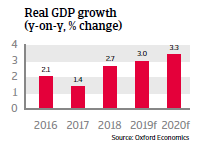
Concerns about Colombia´s fiscal deficit and narrow revenue base remain an issue, and led some major rating agencies to revise their rating outlook for Colombia in 2018. In December 2018, Congress passed legislation increasing income taxes on high earners, reducing corporate taxes and taking additional measures against tax evasion. However, a politically controversial increase in value-added tax on basic food was opposed, and it remains to be seen if the government can meet its fiscal targets, which aim to cut the deficit to 2.4% of GDP in 2019 and finally to 1% of GDP by 2027.
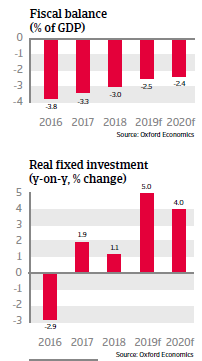
Colombia’s external economic position remains solid. Stable investment grade ratings and an excellent payment record allow Colombia to easily access international capital markets. The international liquidity position remains sound, with international reserves amounting to about 10 months of import cover, fully covering the external financing requirement. Official reserves are underpinned by a precautionary IMF Flexible Credit Line, which provides stronger insurance against heightened external risks, as Colombia remains vulnerable to adverse investor sentiment due to a relatively large stock of inward portfolio investments. Additionally the flexible exchange rate serves as a shock absorber, supported by limited dollarisation of the economy and modest external debt.
Despite significant economic progress in recent years, Colombia still has high rates of poverty and inequality, especially in rural areas. In order to achieve sustainable long-term economic growth, job growth promotion, social reforms and infrastructure improvement would be necessary.

